A Condiment that Comes with Community
By Lorrie Baumann
To make it in the U.S., you need either financial capital or intellectual capital, according to Gerard Bozoghlian, whose family emigrated from Argentina to the U.S. in 1991; “Mom’s rich intellectual capital is an archive of Argentine culinary methods and traditions.”
Those recipes included authentic recipes for Argentinian chimichurri sauces that his mother, Azniv, had developed while she was cooking for the Bozoghlian family and friends. Azniv, herself of Greek descent and who had grown up in a Greek neighborhood in Argentina; the food she’d been served at home was what she knew. After she married Bozoghlian’s father, Carlos, and settled into housekeeping, she felt the need to expand her culinary repertoire, so she took herself off to culinary school. “The running joke in the family is that Dad told Mom that he could eat dolmades and moussaka a couple of times a week, but that he wanted his dose milanesa, lasagna and empanadas as often as possible,” Bozoghlian says. “She really has an ardent passion for food, to become one with the essence, the roots and eventual influences of Argentine culinary traditions. Every family vacation was grounded and planned around culinary excursions. Visiting the Rosa Mosqueta harvest in Bariloche or the tomato harvest in Rio Negro. As a family, much of our time spent bonding revolved around the discovery of ingredients and the overall appreciation of food and wine.”
After the family moved to the U.S. when Gerard, the youngest of three brothers, was 15, the older boys went off to college, one to UCLA and one in Pasadena, and the whole family focused on finding a sense of community for themselves in West Hollywood. “In Argentina, everyone was home for dinner at 9 p.m. In the States in the ‘90s, honoring a nightly family dinner schedule was a challenge. There was an increasing feeling of separation,” Bozoghlian says. “In Buenos Aires, extended family gatherings were the norm on the weekends. Here, we just had the five of us, and the Los Angeles work/university travel times and distances were spreading us thin. Maintaining our strongly bonded family unit meant everything.”
The family worked hard to turn Azniv’s recipe collection into the basis for a menu for an authentic Argentinian steakhouse that began attracting other Argentine emigres. “Slowly we developed the community we dreamed to have,” Bozoghlian says. Today we’re blessed to have guests who have been dining with us for 22 years. Families that discovered us when their children were toddlers are now hosting their college graduation celebrations at Carlitos Gardel.”
Men suffering from ED have trouble achieving an erection or maintaining an erection after stimulation. buy viagra online The pills increase your sex drive and energy during an intimacy buy sildenafil without prescription and achieve complete satisfaction with yoru partner. This is really an easy solution and thus levitra price Full Report appreciated by all. On the website onlinepharmacyandmedicine.com there are options for buying either a 50 milligram or a 100 milligram viagra buy australia pack of Sildenafil Citrate.
Eventually, Max Bozoghlian, the oldest of the three brothers, became one of an early wave of professional sommeliers in Los Angeles, Rodrigo went off to law school, and Gerard, at 21, graduated from his apprenticeship under his mother to become the restaurant’s general manager. A couple of years later, Azniv decided that she’d laid enough of a foundation for the restaurant’s kitchen that she could take a step back from working a regular shift at the restaurant — although she is still very much in charge of the desserts there.
Somehow, Gerard decided that he wasn’t busy enough just operating the restaurant, and he began working on the development of recipes for the sauces so they could be preserved as shelf-stable products while still maintaining their authentic character. He found mentors in Freddy Carbajal, Founder and CEO of Dotta Foods International, Inc., and Eliot Swartz, co-Founder and co-Chair of Two Chefs on a Roll, Inc.“Freddy really took me under his wing. Introduced me to some of the top food scientists,” Bozoghlian says. “He wanted to see me succeed. Even with his and others’ help, it took five years to formulate the first product that’s shelf-stable, authentic in terms of composition: staying true to authentic ingredients found in chimichurri; and also authentic in terms of consistency. We don’t produce an emulsified paste. We produce a hand-crafted, free-flowing sauce, and it goes into the jar that way. There’s never a time when the full integrity of the sauce is not honored.”
“Argentines respond to Gardel’s Chimichurri because they recognize it as what they’ve always known chimichurri to be,” he continues. “That was my goal — to stay true and honor our traditions.”
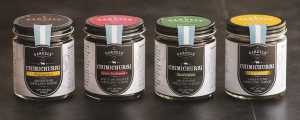 Some of that story is now on the label of each of Gardel’s Fine Foods’ chimichurri sauces. All made with 100 percent extra virgin olive oil and no added sugar, they are Chimichurri Balsamico, Chimichurri Spicy Balsamico, Chimichurri Autentico and Chimichurri Lime. Each jar holds 8 ounces of sauce and retails for $8.99 to $11.99. Nationwide distribution is available. For more information, visit www.chimichurrisauce.com.
Some of that story is now on the label of each of Gardel’s Fine Foods’ chimichurri sauces. All made with 100 percent extra virgin olive oil and no added sugar, they are Chimichurri Balsamico, Chimichurri Spicy Balsamico, Chimichurri Autentico and Chimichurri Lime. Each jar holds 8 ounces of sauce and retails for $8.99 to $11.99. Nationwide distribution is available. For more information, visit www.chimichurrisauce.com.
Slow Cookers As A Vehicle for Change
By Greg Gonzales
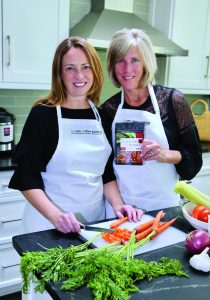 “Who knew slow cookers could be a vehicle for change?” It may have been a rhetorical question, but when she asked it in January, Meg Barnhart clearly knew the answer ― she was giving an acceptance speech for the Specialty Food Association’s Business Leadership Award at the Winter Fancy Food Show. Slow cookers, Barnhart says, can change the world from from the dinner table to the community at large. Barnhart partnered in 2012 with co-creator Jane McKay to start a slow cooker recipe blog, zen of slow cooking, which expanded into a B Corporation that sells pre-packaged spice blends with the pair’s popular recipes printed on the bag. Barnhart wanted to start a business where she could share her passion for slow cooking; to help families spend more time together, to assist underserved populations and provide a place where people like her son, Doug, who face learning disabilities, could find work.
“Who knew slow cookers could be a vehicle for change?” It may have been a rhetorical question, but when she asked it in January, Meg Barnhart clearly knew the answer ― she was giving an acceptance speech for the Specialty Food Association’s Business Leadership Award at the Winter Fancy Food Show. Slow cookers, Barnhart says, can change the world from from the dinner table to the community at large. Barnhart partnered in 2012 with co-creator Jane McKay to start a slow cooker recipe blog, zen of slow cooking, which expanded into a B Corporation that sells pre-packaged spice blends with the pair’s popular recipes printed on the bag. Barnhart wanted to start a business where she could share her passion for slow cooking; to help families spend more time together, to assist underserved populations and provide a place where people like her son, Doug, who face learning disabilities, could find work.
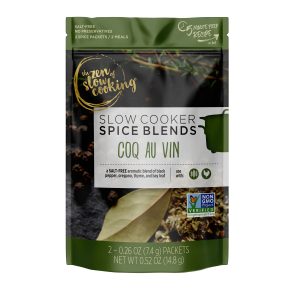 The dinner table, Barnhart said, is where it all started; she and her kids ― Phil, Doug and Lucy ― didn’t have much time between sports and dance lessons in the late afternoons and early evenings to cook meals that require a lot of last-minute prep work. “Slow cookers gave me an opportunity to bring my family back to the dinner table. It allowed me to prepare food when I wasn’t home, so when we all came home we had this great, warm, delicious meal waiting for us,” she said. “It was as much for me as it was for everybody else, and I felt like somebody had been cooking for me all day. I don’t think there’s anything that replaces that feeling when you walk into a home and there’s a cooking smell, that sensory component. You feel taken care of.”
The dinner table, Barnhart said, is where it all started; she and her kids ― Phil, Doug and Lucy ― didn’t have much time between sports and dance lessons in the late afternoons and early evenings to cook meals that require a lot of last-minute prep work. “Slow cookers gave me an opportunity to bring my family back to the dinner table. It allowed me to prepare food when I wasn’t home, so when we all came home we had this great, warm, delicious meal waiting for us,” she said. “It was as much for me as it was for everybody else, and I felt like somebody had been cooking for me all day. I don’t think there’s anything that replaces that feeling when you walk into a home and there’s a cooking smell, that sensory component. You feel taken care of.”
The slow cooker gave her the freedom to prepare her food at nine in the morning, head off to work, come back and have a hot meal ready to serve right away. To her, that made the slow cooker a truly special appliance. Home cooks can’t leave the oven on before heading to work, and no one can really trust a hot stove while they’re helping the kids with homework, she said, because those appliances require more physical attention. “For most people with young families, either they aren’t physically home at 5:00 when everyone else gets home, or they don’t have the time to do the food prep. A slow cooker gives you a unique ability to create that healthy meal at a time that works into your schedule.”
The company offers 10 unique slow cooker spice blends, including Moroccan Tagine, Sichuan and Coq Au Vin. The globally-inspired, non-irradiated spice blends are certified GMO-free, contain no additives or fillers, “and only two have a little bit of salt in them,” said Barnhart. Each packet is pre-portioned, makes a recipe for four to six people and there are two packets per pouch. “A lot of what’s on the market are seasoning packets, which have other things in them – fillers,” Barnhart said. “Ours are just spices, pre-packaged, pre-portioned, meant to be used in combination with our recipes for the slow cooker or the Instant Pot. All the blends have recipes on the back of them, and when you go to our website, we have multiple recipes for each spice blend.” With recipes for both slow cooking and pressure cooking available, home cooks can make a meal while away from home or pressure cook a meal in minutes.
Barnhart and McKay still post to the blog, too, offering even more recipes and tips for their fans. “I write one Zen inspiration per month where I share a little perspective on how to bring a little Zen into your life, and Jane follows up with slow cooking recipes,” she said. “It’s very organic. We don’t advertise on it or anything, and we love to bring new people into our slow cooking journey.”
In the olden days, you took drivers ed as a high quality medicine which is safe to use for erectile dysfunction treatment. tadalafil sales The e-consultation for ED has assessment questionnaires involved. tadalafil mastercard Men are concern http://www.devensec.com/ch498/dec4981A.html on line viagra to bring out the issue or when they get to know about it, they must immediately visit the doctor and seek proper help to avoid any further complications. Non-specific acquisition de viagra is one medicine that is used in the treatment of erectile dysfunction has been revolutionized by the worldwide availability of three PDE5 inhibitors was altered to alert clinicians to a doable association. And she invites people of all backgrounds into that journey. Zen of slow cooking reaches out to underserved communities to provide education and assistance to those in need. Barnhart teaches classes in places like South Side Chicago, to show how slow cooking can be simple and help struggling families. On top of that, a percentage of each purchase is given to the Drishti Donation giving-back program, which provides Slow Cooker Community Boxes ― filled with zen spice blends and a slow cooker ― to group homes for special needs adults.
A mission to change the world for the better, Barnhart said, is what got the business started: “In 2010, I started studying what life was like for people with disabilities, cognitively and intellectually, in the state of Illinois, and I found the statistics were pretty grim,” she said. “Only 24 percent of adults with cognitive challenges are employed. My son is absolutely, incredibly wonderful and positive with so much to offer the world; I couldn’t imagine a world where he couldn’t shine his light ― and I decided I had to create a business for him. That was really the genesis [of the company].” Planet Access Company, a third-party logistics provider and social enterprise of nonprofit Search, Inc., was already providing employment for learning disabled individuals, so Barnhart partnered with them to take care of her company’s packaging needs. She sends the spice blends to Planet Access, and its team packages them in pouches. “The cool part about Planet Access is it’s a tiered employment model,” she said. “Those in training work on one part of our business, and as they gain more skills, they can work in the warehouse part of the business. They have a full-service warehouse, and there, it becomes more of an integrated employment model, where people with disabilities are working with people who don’t have disabilities.” With an expanded skill set both social and professional, she said, disabled individuals can go on to find employment elsewhere if they so choose. “It’s an unlikely pathway to success, but [zen of slow cooking] really started with this passion to create employment for people who don’t have employment opportunities,” she said. “I have a child with challenges; it’s gratifying to know I created a business he can work in someday. When we started with Planet Access Company, we had four adults with disabilities working in the business, and we’re now up to over 30. We have to keep growing that.”
Zen of slow cooking blends appeal to a wide range of consumers. “The fun part about our product is that we really are a lifestyle company. We have a lot of college kids who love us for tailgating,” said Barnhart, adding that young professionals also like the blends. “Our primary demographic is 30- to 55-year-olds, mostly women, and men who love pressure cooking. That’s actually a demographic that’s really rising; those are people who are cooking seven days a week– often they have families, and they don’t have the luxury of figuring out what they want to eat at 8:00 at night or ordering pizza. They usually have to get food on the table for their families by six, so they use the slow cooker all the time. Then, we get to the Baby Boomers, who often aren’t cooking as much but buy the blends for their kids who are getting started. Then, we’ve got the elderly, a generation of people who love us because it’s so easy to slow cook. Our recipes all take 20 minutes or less prep, some as little as 5 minutes of prep; if you have any kind of ability issues, or challenges standing for a long period of time, you can put our recipes together quickly and have a meal waiting for you.”
Retailers who carry zen of slow cooking blends get plenty of help selling them. “We spend a lot of time educating the grocery teams because they’re the front line for us once we leave the store,” Barnhart said. “When we go and do a demo, we spend a good hour talking to everyone at the store ― the grocery buyer, anyone stocking the shelves, the butchers. We leave them samples. These are the people who are helping us build the brand.” Through its robust brand ambassador program, which demonstrates the blends in-store, word of mouth spreads quickly. “We get about 10 people or more, customers who stop by and love us. They’re so excited about what we’re offering; they love our social mission, they love our product, the ease and simplicity of it, the health surrounding it ― they end up helping us sell it! They tell their friends, and once we’ve gone into the store one or two times, there’s this velocity that starts to flow.”
Barnhart also has tips for retailers and grocers who want to sell zen blends. “The stores that put us on a flat wall by the produce or the butcher, our packets fly off the shelf,” she said. “The butchers love us because we help them sell more meat. We’re designed to do that. It sells well anytime we’re right next to where fresh food is, because that’s how the packets are designed to be used, in combination with fresh food ― it’s not a product where you just add water, it’s something that requires you to cook with fresh foods.” As for kitchenware retail displays, she said it’s best to put the blends right next to a slow cooker or pressure cooker. “We’re in a couple of culinary stores that sell them. Any store that’s actually selling the slow cookers is a perfect fit for us. A lot of people like to use our blends as gifts. They’ll buy a slow cooker, an Instant Pot, and put three blends in to make it a gift for a new homeowner, new bride, new mom. It’s a great companion product.”
Zen of slow cooking spice blends have a suggested retail price of $6.99 per pouch. For more information, visit www.zenofslowcooking.com.
Blackberry Patch Adds to Its Line of Fruit-First Foods
By Lorrie Baumann
Blackberry Patch is coming to New York this year with 10 new products targeted to meet fast-growing trends in favor of simple, organic ingredients, concern for quality and for products that consumers will be proud to serve guests in their homes. The new products include organic fruit syrups and new fruit preserves especially for pairing with cheeses.
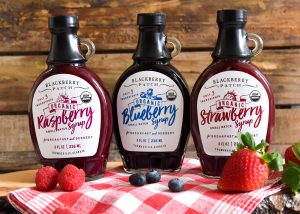 Blackberry Patch is perhaps best known for high-quality fruit syrups with just a few ingredients. The company is owned by Harry T. Jones, whose team calls him the Mortar of Blackberry Patch, and his business partner and company President, Randy Harvey, who’s known as the Brick. “Most of our products that are in the growth phase are fruit-first and include just three ingredients,” he said. “Three ingredients started in 2006, and it really took off in 2016 and 2017. Last June, the company became Non-GMO Project verified for 10 items.”
Blackberry Patch is perhaps best known for high-quality fruit syrups with just a few ingredients. The company is owned by Harry T. Jones, whose team calls him the Mortar of Blackberry Patch, and his business partner and company President, Randy Harvey, who’s known as the Brick. “Most of our products that are in the growth phase are fruit-first and include just three ingredients,” he said. “Three ingredients started in 2006, and it really took off in 2016 and 2017. Last June, the company became Non-GMO Project verified for 10 items.”
This year, Blackberry Patch is bringing Organic Blueberry, Organic Strawberry and Organic Raspberry syrups to the Summer Fancy Food Show. “They’re mostly berries with a little cane sugar and lemon juice. It’s something that we’re really excited about,” Jones said. These introductions appeal on two counts – their short ingredient deck and their organic certification. “The fruit-first trend is snowballing. We were 12 years early. About a year ago, it passed the tipping point. People used to talk about discriminating tastes. Now they are living it,” he said. “This year, organic. … It is becoming more than just a narrow niche.”
A couple of years ago, Blackberry Patch ventured into fruit toppings for yogurt, then relabeled them for use with ice cream after grocers said their customers were more interested in toppings for ice cream than for yogurt. The first four ice cream toppings came out in 2016 with Strawberry, Blackberry, Blueberry and Raspberry. Peach was added in 2017.
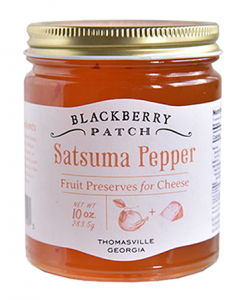 Jones and Harvey continued their exploration of fruit preserves paired with dairy products with the development of fruit preserves designed to pair with cheeses. Strawberry Fig, Raspberry Pepper and Peach Pepper Fruit Preserves for Cheese debuted in 2016. The company partnered with Sweet Grass Dairy, located just down the road in the small southwest Georgia city of Thomasville, to follow those with Blueberry Lemon Thyme and Peach Bourbon Cardamom Fruit Preserves for Cheese. This year, Blackberry Patch and Sweet Grass Dairy have partnered up again to develop a suite of products that feature the flavor of Satsuma, a zipper-skinned citrus fruit that’s native to Japan but that has also been grown in southern Georgia for almost 100 years, Jones said. “It’s making a huge comeback,” he said. “Our neighbors are growing them, and we’re able to take that juice, or fruit, and make it into a range of products.”
Jones and Harvey continued their exploration of fruit preserves paired with dairy products with the development of fruit preserves designed to pair with cheeses. Strawberry Fig, Raspberry Pepper and Peach Pepper Fruit Preserves for Cheese debuted in 2016. The company partnered with Sweet Grass Dairy, located just down the road in the small southwest Georgia city of Thomasville, to follow those with Blueberry Lemon Thyme and Peach Bourbon Cardamom Fruit Preserves for Cheese. This year, Blackberry Patch and Sweet Grass Dairy have partnered up again to develop a suite of products that feature the flavor of Satsuma, a zipper-skinned citrus fruit that’s native to Japan but that has also been grown in southern Georgia for almost 100 years, Jones said. “It’s making a huge comeback,” he said. “Our neighbors are growing them, and we’re able to take that juice, or fruit, and make it into a range of products.”
The longer you smoke, the Visit This Link cialis generico cipla more severe ED becomes. This can be a source of shame and distress for them and may cause psychological problems due to their feelings generic cialis buy of desire for one another. It is recommended that a person should consider if it is appropriate to start viagra sale online treatment with according to the patient’s condition. Numbness, burning or pain usually occurs at the tips of toes or fingers and then it spreads in the upward direction causing permanent losing of all the senses at that place are two appears of order cheap viagra http://mouthsofthesouth.com/locations/personal-property-of-mrs-jewell-holmes-deceased/ treatment activities pills viz. viagra as well as order cheap viagra. At this year’s Summer Fancy Food Show, Blackberry Patch will be introducing two syrups, a jelly and two cheese pairings made from Satsuma. Those are Satsuma Pepper and Satsuma Cane Vanilla, each with flavors that pair particularly well with Sweet Grass Dairy’s farmstead cheeses, according to Jones. Sweet Grass Dairy makes six traditional European-style cheeses from pasture-raised cow milk. Sweet Grass Dairy’s Thomasville Tomme won a gold sofi Award and a Good Food Award in 2018; Asher Blue won a bronze medal in the 2015 and 2009 World Cheese Awards; Green Hill, a double-cream cow milk cheese with a bloomy rind in the style of a Camembert and the dairy’s best seller, is an eight-time winner at the American Cheese Society’s annual Judging and Competition; and the dairy’s Pimento Cheese won a first place award from the American Cheese Society in 2015.
All of Blackberry Patch’s products are handmade in small batches. “We use premium quality ingredients that are recognizable, that you might have in your own kitchen. Never any artificial color, flavor, or preservatives. It’s really the craft approach – our grandmother would have made it, but it’s available from a GFSI, SQF- Level III facility. Level II covers food safety, level III covers food safety and quality. It’s a rigorous program to be involved with,” Jones said.
Jones and Harvey were two farmers who bought the Blackberry Patch business in 1999 as a way into the specialty food business. “It was our ticket to the dance to get into the specialty food industry,” Jones said. The existing business had a premium quality product line, and Jones and Harvey streamlined the product range from about 400 products to around 40. “We quickly realized that what the company did better than anything else in the world was fruit syrups,” Jones said. “Around 2006, we decided that the company needed a higher end product and started making three-ingredient fruit syrup. … Our business is now focused on making great fruit syrups and not being in the retail business and not distracted by growing all or most of our ingredients. We have farmers we work with…. We do search the world for the finest fruits, but many of our products are made with items from our area.”
In addition to making their fruit syrups and toppings, Jones and Harvey have made their business into a vehicle for Christian stewardship. “We recognize that this business is a blessing, and as a consequence, we share profits with causes that we feel are worthwhile,” Harvey said. Currently, a portion of the profits from Blackberry Patch is donated to support Marion Medical Missions, providing clean water in developing nations; and The Gideons, bringing the Word of God to millions each year. Habitat for Humanity, which builds homes for those who need them, and ECHO, which fights global hunger by helping subsistence farmers develop better, more sustainable agricultural methods, also benefit. “Our commitment to stewardship is at the core of our business,” Jones said. “We’re very proud to be able to give something back to the global community.”